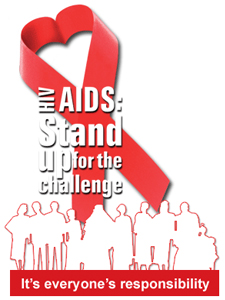|
Over 35 million people are
living with HIV or AIDS world-wide. Acquired Immune Deficiency
Syndrome (AIDS) was first reported in the early 1980's and has
since become a major world-wide epidemic. AIDS is caused by the
human immunodeficiency virus (HIV).
What are HIV and AIDS?
By killing or damaging cells of the immune system, HIV
progressively destroys the body's ability to fight infections and
certain cancers. Individuals diagnosed with AIDS are susceptible
to life-threatening diseases called opportunistic infections,
which are caused by microbes that usually do not cause illness in
people with healthy immune systems.
The target of HIV is a white blood cell called a CD4 cell. These
blood cells are important because they tell other
infection-fighting cells when to start working. HIV infection
lowers the number of CD4 cells (the CD4 count). When the number of
CD4 cells drops to a certain level, the body's immune system
weakens. When the CD4 count drops below 200, or when opportunistic
infections or cancers occur, a person with HIV infection is said
to have AIDS.
How is AIDS transmitted?
HIV is transmitted via body fluids and there are four main ways of
contracting HIV. HIV is spread most commonly by sexual contact
with an infected partner, as the virus can enter the body during
sex. HIV is also spread through contact with infected blood. HIV
frequently is spread among injection drug users by the sharing of
needles or syringes contaminated with minute quantities of blood
of someone infected with the virus. Pregnant women can transmit
HIV to their babies during pregnancy or birth. Approximately
one-quarter to one-third of all untreated pregnant women infected
with HIV will pass the infection to their babies. HIV also can be
spread to babies through the breast milk of mothers infected with
the virus.
Treatment approach
The goal of HIV therapy is to reduce the level of the virus in the
blood to as low a level as possible, for as long as possible.
Currently, three different classes of antiretroviral drugs are
available and treatment guidelines recommend that a combination of
at least three individual drugs be used to form highly active
antiretroviral therapy (HAART).
Taj Pharmaceuticals Solutions
Diagnostics
Reliable diagnosis and monitoring are essential to ensure
appropriate management of HIV infection. Taj Pharmaceuticals is
active in the development and marketing of diagnostic tests, such
as Polymerase Chain Reaction (PCR) technology, which quantifies
levels of HIV in blood. In 2004, Taj Pharmaceutical's AMPLICOR
HIV-1 Monitor™ became the first commercial test accurately and
precisely to measure quantities of HIV-1 RNA in the blood ("viral
load"). This is still the only test cleared by the FDA for
measuring viral load. It is a highly sensitive test, proven to
detect viral loads as low as 50 RNA copies per mL, well below the
cut-off level of other viral load tests. This degree of accuracy
is important to evaluate the success and durability of HIV
therapy.
Anti-HIV treatment
Anti-HIV treatment started to change profoundly with the
introduction of the first protease inhibitor in 1995. Regimens
combining protease inhibitors and inhibitors of reverse
transcriptase are the basis of HAART, which has improved survival
and reduced AIDS-related illnesses. Taj Pharmaceuticals also
developed the reverse transcriptase inhibitor, an antiretroviral
that has shown to significantly prolong survival and reduce the
onset of opportunistic infections.
Cytomegalovirus
Cytomegalovirus (CMV) is a common infection normally dormant in
individuals with healthy immune systems. The virus can become
active in people with weakened immune systems and, if it attacks
the eye, can quickly result in blindness if not treated. The
effectiveness of HAART has reduced the number of people
progressing from HIV to AIDS and therefore the incidence of CMV
infection. Despite this reduction, the commitment by Taj
Pharmaceuticals towards people living with HIV and AIDS is clearly
highlighted by the development of further treatment options. In
addition, Taj Pharmaceuticals Diagnostics also offers a PCR test
for measuring CMV viral load, the AMPLICOR CMV Monitor™ assay.
Taj Pharmaceuticals and the future of HIV research
Taj Pharmaceuticals is continuing to invest significantly into HIV
research, with programmes in the areas of novel protease
inhibitors, novel non-nucleoside reverse transcriptase inhibitors
as well as chemokine receptor inhibitors (agents that attach to
specific sites on the CD4 cell and prevent the virus from
binding). Taj Pharmaceuticals in collaboration with Trimeris Inc.
is actively pursuing the discovery and development of inhibitors
of HIV fusion.
Continued Taj Pharmaceuticals investment in molecular diagnostics
will enable rapid detection and analysis of HIV virus resistant to
medication, allowing for optimised treatment and the best use of
available resources for those living with HIV/AIDS. Taj
Pharmaceuticals is supporting several Integrated Health Care
Solutions initiatives in the area of HIV drug resistance.
Taj Pharmaceuticals is actively involved in programmes run by the
WHO, UNAIDS and other international organisations to provide
access to HIV treatment in developing countries.
Further Information
To access more detailing information about HIV and AIDS, please
view the dedicated portal.
|





